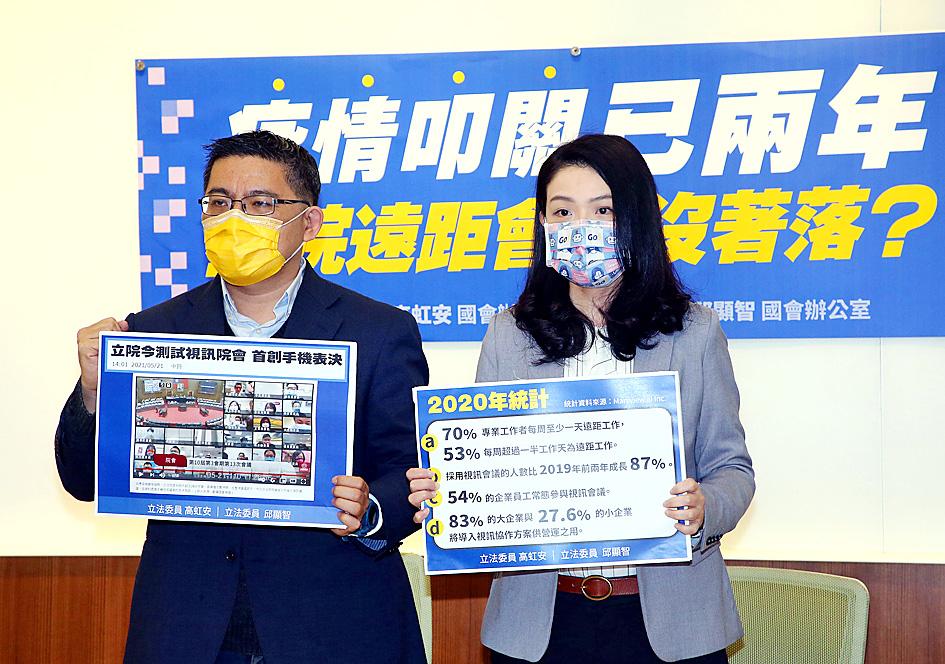Taiwan People’s Party (TPP) legislators yesterday called on the Legislative Yuan to launch a videoconference system for legislators in isolation or quarantine, and urged the government to purchase more oral antiviral drugs for treating COVID-19.
TPP Legislator Ann Kao (高虹安) and New Power Party Legislator Chiu Hsien-chih (邱顯智) yesterday held a joint news conference calling on the Legislative Yuan to speed up its digital transformation with videoconferencing for legislative meetings, as the risk of infection continues with the Omicron variant of SARS-CoV-2.
In May last year, the legislature tested a videoconferencing system, but it had not been tested, updated or officially used since then, neither had legislators received a standard for using it, Kao said.

Photo: CNA
Five TPP legislators might have been placed in isolation, she said, adding that the TPP was to hold its year-end banquet at the Grand Hotel Taipei (圓山飯店) on the day after the chef tested positive for COVID-19.
Without a videoconferencing system, legislators who are placed in isolation cannot review the government budgets or vote, Kao said.
Many governmental departments or companies have adopted ways to work from home to reduce the risk of infection clusters in the workplace, she said, adding that the legislature last month passed the third reading of an amendment to the Company Act (公司法) allowing shareholders’ meetings to be held via videoconferencing in the case of disaster or special circumstances.
City and county councils, courts and schools have held drills on how to hold meetings, court sessions or classes online in the event that the COVID-19 alert is raised to level 3, but the legislature still lacks such a measure, Chiu said, urging it to speed up finalizing the videoconferencing system.
Separately yesterday, TPP legislators Chiu Chen-yuan (邱臣遠) and Tsai Pi-ru (蔡壁如) held a news conference urging the Central Epidemic Command Center (CECC) to work closely with local governments on announcing to the public as soon as possible disease prevention guidelines for the Lunar New Year holiday.
Despite local Omicron cases mostly having mild symptoms, or being asymptomatic, and the infection sources of some cases remaining unknown, the nation’s healthcare capacity is a big concern, especially when entering the Lunar New Year holiday, Tsai said, asking whether the CECC had prepared holiday measures.
She said that people should consider sharing holiday greetings with friends by telephone, sending digital red envelopes and having gatherings via videoconferencing.
The government has procured 25,000 courses of oral antiviral treatments for COVID-19, which is only about 0.1 percent of the population, while South Korea has purchased enough for 2 percent and the US has enough for 7 percent, Chiu Chen-yuan said.
The CECC should explain its plan for using the nation’s inventory of oral antiviral treatments against COVID-19, he said.
Additional reporting by CNA

Trips for more than 100,000 international and domestic air travelers could be disrupted as China launches a military exercise around Taiwan today, Taiwan’s Civil Aviation Administration (CAA) said yesterday. The exercise could affect nearly 900 flights scheduled to enter the Taipei Flight Information Region (FIR) during the exercise window, it added. A notice issued by the Chinese Civil Aviation Administration showed there would be seven temporary zones around the Taiwan Strait which would be used for live-fire exercises, lasting from 8am to 6pm today. All aircraft are prohibited from entering during exercise, it says. Taipei FIR has 14 international air routes and

The Ministry of National Defense (MND) today released images of the military tracking China’s People's Liberation Army (PLA) movements during the latest round of Chinese drills around Taiwan. The PLA began "Justice Mission 2025" drills today, carrying out live-fire drills, simulated strikes on land and maritime targets, and exercises to blockade the nation's main ports. The exercises are to continue tomorrow, with the PLA announcing sea and air space restrictions for five zones around Taiwan for 10 hours starting from 8:30am. The ministry today released images showing a Chinese J-16 fighter jet tracked by a F-16V Block 20 jet and the

Snow fell on Yushan (Jade Mountain, 玉山) yesterday morning as a continental cold air mass sent temperatures below freezing on Taiwan’s tallest peak, the Central Weather Administration (CWA) said. Snowflakes were seen on Yushan’s north peak from 6:28am to 6:38am, but they did not fully cover the ground and no accumulation was recorded, the CWA said. As of 7:42am, the lowest temperature recorded across Taiwan was minus-5.5°C at Yushan’s Fengkou observatory and minus-4.7°C at the Yushan observatory, CWA data showed. On Hehuanshan (合歡山) in Nantou County, a low of 1.3°C was recorded at 6:39pm, when ice pellets fell at Songsyue Lodge (松雪樓), a

City buses in Taipei and New Taipei City, as well as the Taipei MRT, would on Saturday begin accepting QR code payments from five electronic payment providers, the Taipei Department of Transportation said yesterday. The new option would allow passengers to use the “transportation QR code” feature from EasyWallet, iPass Money, iCash Pay, Jkopay or PXPay Plus. Passengers should open their preferred electronic payment app, select the “transportation code” — not the regular payment code — unlock it, and scan the code at ticket readers or gates, General Planning Division Director-General Liu Kuo-chu (劉國著) said. People should move through the